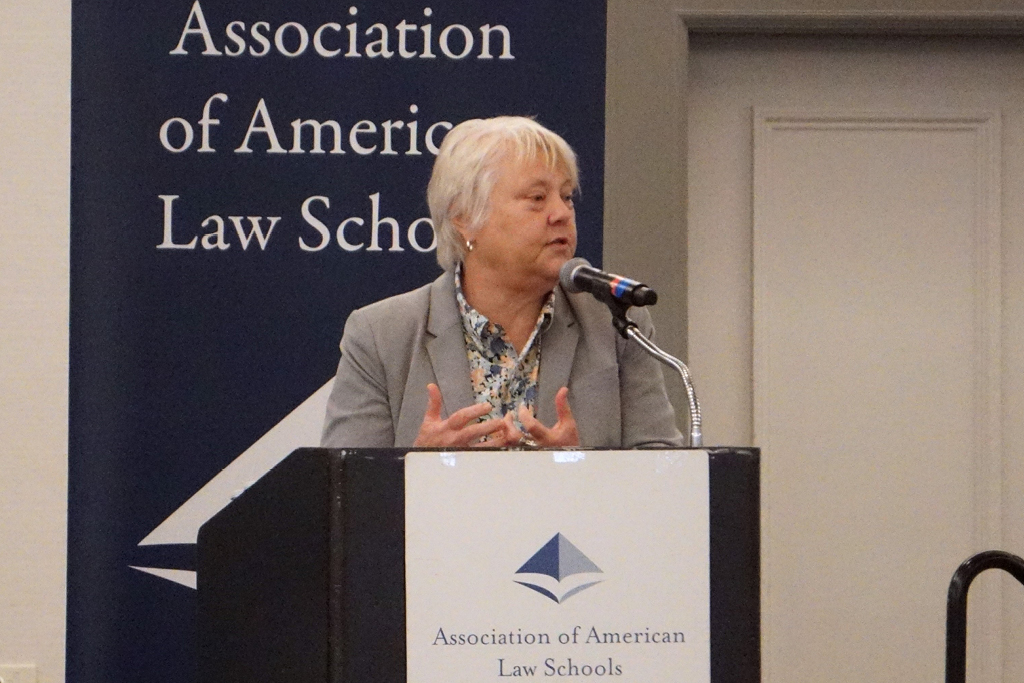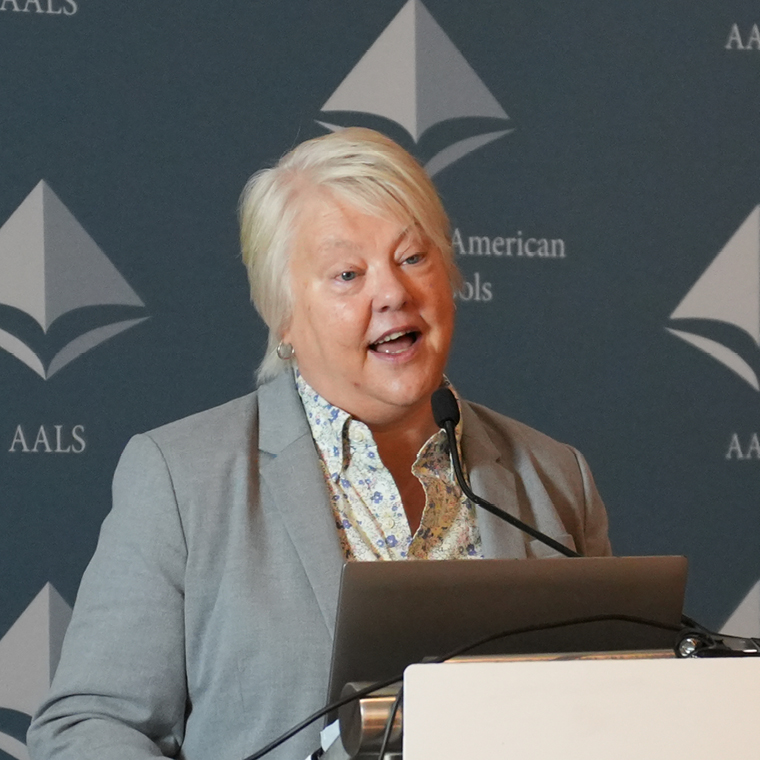By Barbra Elenbaas
Kellye Y. Testy began her role as AALS Executive Director and Chief Executive Officer on July 1, 2024. She succeeds Judy Areen, who retired after serving in the role for the past 10 years. Over the summer, Testy sat down with AALS News to discuss her new role, the importance of legal education, and her goals for the organization.
When did you first get involved with AALS? What kept you involved?
I went to the Annual Meeting every year when I first started teaching at the University of Puget Sound (now Seattle University). One of my colleagues told me that I had to go—and she joked that I should go even if no one talked to me because they were looking for someone more famous. She was an outstanding scholar and loved hearing the latest papers and discussions.
I kept coming back and got involved with various AALS Sections because I was able to meet colleagues from around the country and work on substantive issues. At that time, I was focused on corporate accountability issues and there were not many faculty members yet taking that more progressive approach to corporate law. It was easy to feel somewhat isolated at your own school. Similarly, the other area I worked in was law and sexuality and that field really blossomed through connections made and work done through AALS.
My first formal involvement was on the Committee on Recruitment and Retention of Minority Faculty, then the Executive Committee. On the Executive Committee, we had a way of talking about issues very deeply, but finding agreement in a collegial way. I felt that our conversations really mattered for how legal education was progressing. When I was asked to be AALS President for 2016, it was easy to keep coming back.
I also used to go to sessions at the Annual Meeting that were not in my area, just to learn about new areas of legal development. In our role as a learned society, AALS encompasses every area of law. It helps you see the incredible scale and excellence of legal education in the United States. I also found, as I moved from faculty to dean around 2004, that AALS is very helpful to deans—for our professional development and ability to talk across institutions, to make legal education collectively stronger.
The other half of our dual role, in addition to being the learned society, is to serve as a voice for legal education more broadly. How do you view the balance of those roles?
Having those roles as our pillars is important, because not only do we want to help law schools be excellent, we also want to communicate that they are excellent and that strong legal education matters. When I was AALS president, I invited Brad Smith, the president of Microsoft, to speak at the Annual Meeting. He made the direct and important point that as long as there is a need for justice, there is a need for law. And as long as there is a need for law, there is a need for lawyers, and as long as there is a need for lawyers, there is a need for legal education. Our field is particularly important for democracy and the common good. When the rule of law is strong, people thrive. When the rule of law is weak, people suffer. Our role in building the infrastructure of law and justice is critical.
It can be easy for people to take law and legal education for granted. We don’t want a situation where we only appreciate it once it’s not there. I like to remind people that while it’s easy to think that law is only about dispute resolution or court cases, law is what sets the infrastructure for society to flourish. It’s a privilege for AALS to be the voice of that collective and help people understand the role of law and how good American legal education is.
Brad Smith spoke those words into a different world.
He did. It was 2015-16 and I had chosen the theme “Why Law Matters.” Some people said to me at the time “We’re the Association of American Law Schools, of course law matters!” Well, look what happened. It was the tip of an iceberg. There has been a lot of challenge to law, and we’ve got a lot of work to do. I think it’s easy for people to be cynical about lawyers—there are a lot of lawyer jokes. But when you look inside our law schools, you see our students and faculty and the impact they make on their community. Then step back and see that happening all over the United States. It’s remarkable to see the impact on the development of law everywhere. I want to champion, appreciate, value, and grow that. And never take it for granted.
Do you have specific goals for your tenure as Executive Director?
While I want to take time to listen to what our stakeholders need from us now, I have a few ideas of directions that I hope can be helpful. For one, I want to see AALS continue to be widely welcoming so that all faculty and staff in our member schools feel at home with AALS. Second, I want to marshal our data and technology to do more to help faculty, staff, and deans thrive. We’re here to support them in the entire lifecycle of their professional journeys.
I also hope to create opportunities for deans and faculty to think about the future and start to design now to meet it. We don’t often have time to reflect on the future of legal education—we’re too busy doing what’s in front of us. I would like to identify some things that we can put in place now in preparation for five to 10 years from now.
What are some areas of interest in legal education where you think AALS is poised to have an impact (or is already having an impact)?
One is faculty hiring. It’s so much more complex today than it used to be. There are many more categories of faculty that schools may hire, many different timings because some schools are more year-round than strictly adhering to the academic calendar. Some of them are part online and part in-person. One of our big opportunities is to beef up the resources we provide for the hiring process.
Our 108 sections are also a remarkable resource that spans every subject area and every affinity group. Let’s give them even more tools to be their own mini-associations. More ways to connect with each other, more support for programming outside of the Annual Meeting. I want to see sections come alive even more.
Finally, it’s increasingly hard to be a leader of any academic institution. I love working with the deans. They have to make sure everyone else in the law school has support, and I want to create even more opportunities to support them. When I first joined legal education, our curriculum fit on one page. Our faculty could meet around a big table. Today, law schools have pages of curriculum, many more faculty, many more ways of delivering the curriculum. The business of being a law school is more complex, so we need to rise to the challenge of that complexity.
How would you advise a law professor or staff member who is interested in getting more involved in AALS?
All you have to do is do it. You can get involved with sections and as a volunteer in many capacities. There are six or seven different ways to propose programs for the Annual Meeting. Know that you are welcome.
I realize there used to be a sense that AALS was hard to get involved in. That’s just not true anymore. Sections have democratized the way AALS works—it’s ground-up involvement. It’s a door to a big tent waiting for you to walk through it. All of us welcome and encourage that involvement.
What changes have you seen during the course of your involvement with AALS?
The Annual Meeting is so much bigger and more inclusive. There are multiple ways to get into programs, which has allowed a bigger group of voices. We have opportunities for more timely information. There’s a lot more nimbleness and currency because of the Hot Topic and other late-breaking programs.
The support that AALS provides to deans has also dramatically accelerated. The Deans Forum and Steering Committee have given deans an added voice and venue for professional development. We now have a dedicated discussion list, where deans can talk among themselves about regulatory issues or anything else they want to discuss.
We also amplify positive law school news widely and broadly, which has been very well-received.
What drew you from deanship to your CEO role at LSAC, then from LSAC to AALS?

After being a dean for about 15 years, I realized I was ready to do something else. I cared so much about legal education that I didn’t want to work for just one school. I looked for ways to make a broader impact, and the LSAC opportunity came along. I loved working there because I was able to be very involved in building the future of law students. I think we did a lot during my seven years to build more robust and inclusive pathways to law school.
This role uses my experience as a CEO but links back to my experience as a dean and academic. I was excited to bring my experience to an organization that focuses on excellence in legal education through inspiration and support rather than regulation. We’re here to be a beacon of excellence to help the whole be more than the sum of its parts.
I’m enjoying the chance to reconnect with faculty, seeing sections at work on substantive issues, and re-immerse with the teaching, research, and service missions of law schools.
What is your approach in your first year in the role?
I like the phrase “I’m listening so hard I’m burning calories.” I need to listen internally, to AALS staff who have been in the trenches doing the work of the association. I also need to listen externally, to find out what people think of us, what can we do, what’s working and what’s not, what are the hopes and fears. Then we can be responsive. I plan to get out as much as possible, to get to know the schools. Much of this first year will be a chance to get immersed.
I also want to pick a few things to focus on—some of the things I’ve mentioned. We just keep our heads up and our feet moving, and in five years we can look back at how much we’ve done.
Is there anything else you’d like to let readers know?
I want people to be in touch with me. I hate the phrase “Oh, she’s busy.” I’m not “too busy.” I know how to organize my work life. I want to hear from people. I want to know opportunities where we can make the work of the schools better. I look forward to hearing from a lot of people, and being part of the legal education community. I think the common good is worth working for. Each law school is great on its own, but together is even better. I hope people will join with me and invest in that common good because we are stronger together.
Kellye Testy can be reached at [email protected].

